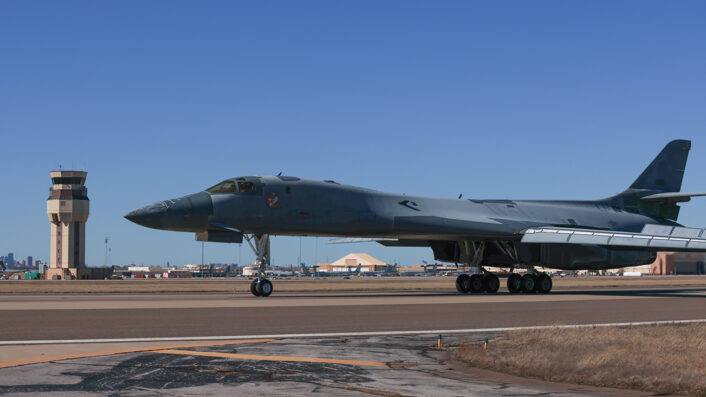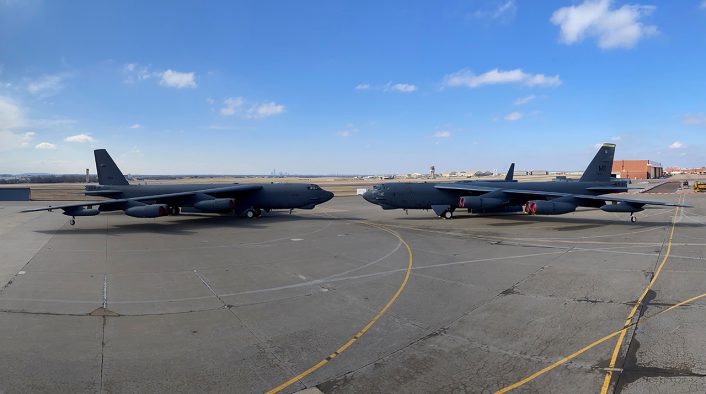Another B-1B was pulled from storage at AMARG and recalled back to duty to bring the BONE fleet back to 45 total Lancers.
B-1B Lancer 86-0115 “Rage” is one of the four bombers out of 17 the U.S. Air Force stored at the 309th Aerospace Maintenance and Regeneration Group (AMARG) at Davis-Monthan AFB, Arizona, and maintained “in a reclaimable condition” so that they could be regenerated if needed.
These stored aircraft, tail numbers 85-0066, 85-0077, 85-0081, and 86-0115, covered with silicone-looking spraylat sealant, to cover gaps, engines, and glass, were placed in Type 2000 storage, just one level below the flyable Type 1000 storage.
On April 20, 2024, a B-1B Lancer bomber of the 7th Bomb Wing, serial 85-0089, experienced a fire engine failure during routine maintenance at Dyess Air Force Base, Texas. The projected repair costs to fix the fire-damaged aircraft were expected to be cost-prohibitive, therefore the U.S. Air Force elected to regenerate one of the four B-1B bombers from the “Boneyard”, at Davis-Monthan AFB, Arizona.

The restoration was required to keep the BONE (as the B-1 is nicknamed in the fighter pilot community) fleet at its congressionally mandated size of 45 bombers in inventory.
The process began in June 2023 and airframe 85-0081 “Lancelot” was selected to be “regenerated”. In February this year, the aircraft was flown to Tinker Air Force Base, Oklahoma, to complete Time Compliance Technical Order (TCTO) updates and Programmed Depot Maintenance (PDM) at the Tinker Air Force Base’s Oklahoma City Air Logistics Complex.
“Rage”
On July 2, 2024, using the radio callsign “SABRE 1,” another B-1B Lancer, airframe 86-0115 “Rage,” landed at Tinker AFB for restoration. Retired in 2021, “Rage” was recalled to duty to bring the fleet back to the mandated 45 B-1Bs.
In the coming months, the bomber will undergo depot-level maintenance to incorporate missed upgrades from its retirement years and perform a thorough check of the airframe and avionics before returning to a frontline unit.
Upon spotting B-1B Lancer 86-0115 “Rage” arriving at Tinker AFB, our friend Rob Stephens at Redhome Aviation contacted the Air Force Materiel Command (AFMC) for details. He suspected the restoration was unrelated to the recent crash of B-1B 85-0085 at Ellsworth AFB, South Dakota.
Brian Brackens from the Air Force Life Cycle Management Center clarified that AFMC was regenerating 86-0115 to replace aircraft 86-0126, which was undergoing extensive repairs at Boeing-Palmdale. Regenerating a stored aircraft was found to be faster and more cost-effective than continuing the repairs at Boeing.
Regarding B-1B 85-0085 “Ruptured Duck,” which crashed at Ellsworth AFB on January 4, 2024, the fate of this aircraft is still unclear. The loss reduces the fleet to 44, raising questions about its replacement. With the upcoming introduction of the B-21 Raider, Congress might allow the fleet to remain at 44 or mandate another regeneration to maintain the fleet size. Currently, no regeneration efforts have begun for the other two aircraft in the boneyard.
The other regenerated bombers
Several years before “Lancelot” and “Rage”, two U.S. Air Force B-52 Stratofortress bombers, “Ghost Rider” (tail number 61-0007) and “Wise Guy” (tail number 60-0034), were reactivated from storage in the “Boneyard” for front-line service. Originally retired and placed in long-term storage for parts cannibalization, these aircraft were later brought back to maintain the Congressional mandate of a 76-strong B-52 fleet.
“Ghost Rider” returned to service in 2015 with the 5th Bomb Wing at Minot AFB, North Dakota, after seven years in the desert. “Wise Guy,” after spending a decade in storage, was resurrected in 2020 and rejoined the 5th Bomb Wing in 2021. These “Lazarus” aircraft were regenerated at the Oklahoma City Air Logistics Complex at Tinker Air Force Base.


